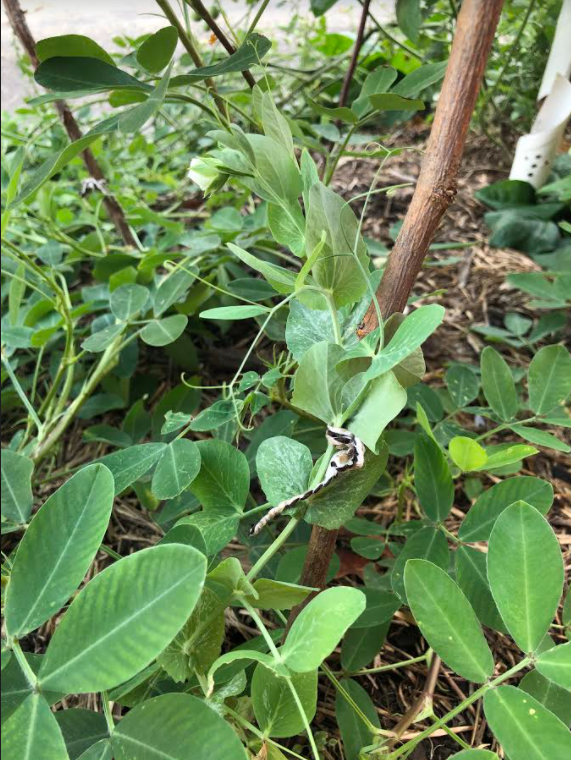UROP Spotlight: Sculpture and Extended Media Major Elijah Scaparo Explores the Vitality of Urban Community Agriculture
By Jenny Pedraza
Each year, students are awarded $1,500 to engage in community-engaged research through The Undergraduate Fellowships for Community-Engaged Research Program (CEnR/UROP), a partnership between the Office of Undergraduate Research and Creative Inquiry and the Center for Community Engagement and Impact (CEI).
How can a community garden function as both a center of food and medicine production and as a space for community building and education related to sustainable food and materials practice?
Can building and holding space in this way ameliorate eco-anxiety that immobilizes change, and instead generate more sustainable relationships with the land and living systems?
This past summer, Sculpture and Extended Media Major Elijah Scaparo utilized a UROP Fellowship to explore these questions through his research project, “Holding Space (For Pawpaw Seedlings): Establishing Permaculture as a Space for Community Gathering, Organizing, and Education Surrounding Native Flora.”
Under the guidance of his faculty mentor, Lily Cox-Richard, assistant professor in the VCUarts Art Foundation Program, Scaparo explored the viability of urban community agriculture, sustainable land use and the employment of native species for food and materials production. He worked to establish a moveable community garden and create a self-published zine.
When you look back on your fellowship this summer, what is the one memory or lesson learned you think will always stick with you?
Both within my research and outside of it, this summer showed me the possibilities held within community, and what a future for us might hold if we are able to reject hierarchy and authoritarian structures, and just take care of each other.

That’s what this project was about for me. One of my favorite moments was working in one of the garden beds on South Granby St., and having a stranger come up to me and tell me that they always appreciate seeing me out there working, and that they didn’t know what I was growing but that it was beautiful. I gave them a tour of the garden, let them know their help would always be welcome, and that they could take whatever they liked. We harvested broccoli greens together, for them to cook that night. After that, whenever I trimmed the broccoli plants in that particular bed, I would leave some greens on their porch.
There were so many moments like this throughout the summer, I think of the sense of solidarity there a lot, how we can all always take care of each other, and how there’s always enough hands, always enough to go around.
Did your experience this summer change or affirm your career or professional interests?
As we head towards Spring, I’m looking into entering a farm apprenticeship. I’m not as interested in being a production farmer as I am in the educational and modeling potentials of small-scale, organic and sustainable farming, and how agricultural practices can be taken beyond the farm and beyond rural communities as means of better land use and wide scale soil and land remediation.
Growing sustainably, to me, means investment in intercropping, permaculture and food forest- based growing as opposed to industrial or field farming.
I know whatever I do, I will be making art and also helping things grow. The experiences I’ve had within this fellowship are directing my life in so many positive ways outside of that, and helping me think about how to build a life where I can do things I love, support myself and support those around me.
What does “community-engaged” mean to you, and why do you think this type of research is important?
To me, community engagement means a responsiveness to the world and to the environment directly around you. It means looking out for your neighbors, friends, coworkers, peers, anyone who shares your daily life. It means no one goes hungry, no one goes without shelter, without care. It means we address issues amongst ourselves, as individuals with autonomy who value one another’s lived experiences and differences.

What part of your fellowship did you enjoy the most?
I really enjoyed gardening with my friends and working dirt in these small little corners, having strangers walk past and be amazed. I loved being able to offer up the food I was growing to anyone who asked, and having that amazing conversation of “of course, it’s free!” I loved walking in the woods and learning about different plants and how many things around us are edible and medicinal and overlooked. I’ve loved thinking up ways to introduce these forgotten foods as an actual source of nutrition, as something which can be grown to add variety to our diets and to agricultural ecosystems.
Categories Community-Engaged Research